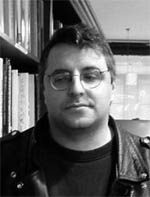 The Nickronomicon is the latest collection from author Nick Mamatas (Innsmouth Free Press). Nick’s other works include Love is the Law, The Last Weekend, The Damned Highway (with Brian Keene), and Move Under Ground. He is an anthologist and editor, and has been nominated for the Bram Stoker award five times, the Hugo Award twice, the World Fantasy Award twice, and the Shirley Jackson, International Horror Guild, and Locus Awards. He is possessed of an outstanding talent, many opinions, and a rather fetching leather jacket.
The Nickronomicon is the latest collection from author Nick Mamatas (Innsmouth Free Press). Nick’s other works include Love is the Law, The Last Weekend, The Damned Highway (with Brian Keene), and Move Under Ground. He is an anthologist and editor, and has been nominated for the Bram Stoker award five times, the Hugo Award twice, the World Fantasy Award twice, and the Shirley Jackson, International Horror Guild, and Locus Awards. He is possessed of an outstanding talent, many opinions, and a rather fetching leather jacket.
1. So, what do new readers need to know about Nick Mamatas?
Nothing, or at least I hope that is the case. If you need to know me to enjoy or even comprehend my stories, I’ve done something wrong. It’s one of the sad side effects of both biographical criticism (way back when) and social media (right now) that some readers feel the need to know the author in order to read the work. Some of the poor dears only want to read the work of “good people”, or at least people they can imagine being friends with. Of course, I say this even though I’ve been blogging for over a decade, and I tweet constantly, though generally I just talk about whatever is on my mind, whether or not it is reader-friendly or not. My little Livejournal user-icon of two pigs in a sty saying “We’ll Never Buy Your Work Again!” (a common lament after I express some controversial political or aesthetic opinion, mostly by people who have never bought my work before) has gotten a fair workout over the past ten years.
Well, that paragraph isn’t exactly designed to make a good first impression, is it? I’ll say I’m a writer, primarily of short fiction and short novels, that writes fairly widely across genres: horror, fantasy, experimental fiction, crime, etc. The novelette “Real People Slash” in my latest collection, The Nickronomicon, is baldly autobiographical except for all the cosmic horror. It’s about squat defense, running from an NYPD armored personnel carrier—the police have been militarized for nearly twenty years though apparently it’s only news in the United States now—and then moving to Vermont. I live in California now, like a normal person.
2. What was the first Lovecraft story you ever read and what about it sticks with you to this day?
Hmm, I don’t actually know. I presume it was “The Rats in the Walls”, as that story is widely reprinted in textbooks for junior high school and high school students, so I probably ran across that early in life, without even attaching the author’s name to the story. I presume it was an abridged version too, given that the cat in the story is named Nigger-Man. I actually don’t think it’s a great story—it even ends with the title, which was an old trick even when Lovecraft was writing. What I do remember clearly is the line about a bunch of human or semi-human bones. “Semi-human” was just incredibly evocative; it’s as though the whole story spins on the axis of that little detail.
3. What was the inspiration behind The Nickoronomicon? 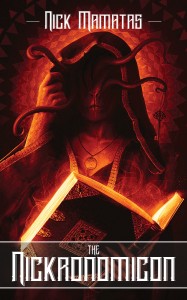
A vegan cookbook. A few years ago, I was at a party and one of the hosts was dating the co-author of Veganomicon: The Ultimate Vegan Cookbook, and a copy was on display in the kitchen, ready to be casually discovered by the party-goers. I saw it and thought to myself “Hey, I want an ___omicon book” and of course “Nick-ronomicon” came immediately to mind. Actually, The Nickronomicon was the working title of my writing essay book Starve Better, but saner heads prevailed. We wanted people who didn’t already know of me to feel like they could buy that book. The title drifted for a while, then Silvia Moreno-Garcia approached me about collecting my Lovecraftian fiction for Innsmouth Free Press, and we just went with it.
4. In general, who and/or what are your writing influences?
All writers get asked that question a lot, and it’s a difficult one to answer honestly, so I suspect most people don’t. Clearly, I’ve written a dozen or more Lovecraftian stories (out of over one hundred published) but is he an influence? I mean, one could say that my gimmick is writing in modes as far from Lovecraft as possible—Beat Lovecraft, gonzo journalism Lovecraft, New Narrative Lovecraft, postmodern Lovecraft where if I am writing pastiche at all, it is pastiche of David Foster Wallace and not of HPL. I love Ellison’s stories, but is he an influence? I certainly don’t sit down and think, “What would Harlan Ellison do?”
On the other hand, I read five Edward St. Aubyn novels this autumn and was so enamored of his use of roving point of view that the next story I wrote used it too—but that story is about working-class people in a dieselpunk world, an alternative 1930s, and St. Aubyn’s books are autobiographical novels about the collapse of the lower echelon of the British aristocracy as seen through the eyes of his alter ego Patrick Melrose. The family loses their summer mansion in France, boo-hoo! My story, “We Never Sleep”, which will appear in The Mammoth Book of Dieselpunk in July, would likely not ever be pegged as influenced by the Patrick Melrose novels except that I just told the Internet.
On the other hand, one could put my novel Love is the Law very easily in the same Ellen category with Sara Gran’s Claire DeWitt series and Elizabeth Hand’s Cass Neary novels, and I love them and read them first and those books made me want to try, but when I was writing Love is the Law I gave zero thought to those authors or their wonderful books. The whole book came from somewhere else.
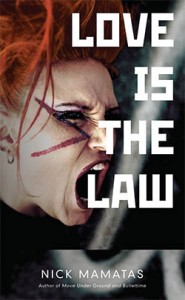 5. When did you first decide you wanted to be a writer?
5. When did you first decide you wanted to be a writer?
Most kids who do well in school and like to read probably decide to be a writer early on, and then also decide to be paleontologists, ice cream men, professional wrestlers, homemakers, brain surgeons, etc. I had no inkling of what being a writer meant or took though. Everyone in my family, when I was a kid, either worked in a restaurant or in construction or as a mechanic of some sort. Sure, I wanted to be a writer. I read the book Sport by Louise Fitzhugh, and in that book Sport’s father is a freelance writer and just sits around and gets checks, albeit small ones, in the mail. Sounded good to me, though Sport’s dad was the poor parent. At least he was poor and safe at home instead of poor and hanging off a longshore crane in sub-freezing temperatures. But had you asked if I wanted to be Spider-Man, or a Loch Ness Monster wrangler, I would have said sure to that as well. I never even met an adult college graduate whose own parents had been to college as well until I actually went to college myself. It all seemed equally impossible to me, though my parents were committed to my education, and didn’t want me busting hump in a restaurant like every other Greek. (True story: I was enrolled in a Greek Orthodox parochial school as a child, and when we first got to the bus stop the other mothers asked my mother which restaurant her husband worked at. It didn’t occur to anyone that he wouldn’t be a waiter or, if set up by other relatives, a maitre d’).
When I got to college, I wanted to make films. I picked up a little knowledge of wiring from helping my father build a house, so I became a gaffer and schlepped lights around various location shoots in the early 1990s, when independent film was getting big, but mostly industrial video and local cable paid my bills. Work dried up in during the Clinton-era recession, and I answered an ad in a newspaper looking for writers. It was a term paper mill, and desperate, I took the job—really, it was a “gig.” Everyone has gigs now and is a member of the precariat, but I was part of the vanguard of losers. I wrote term papers for years, and as I knew my way around the Internet thanks to college, I started writing about it for little art magazines. Then I started doing web content, writing for the business and culture magazines covering the first dot-com boom, and floated into what was then called “punk publishing” in New York’s Lower East Side. I became serious about writing—first, radical journalism and then after 9/11 when most of the so-called left lined up behind the war in Afghanistan and Iraq, fiction.
Honestly, I just liked the idea of working from home, rather than waking up at 4am to make early-morning calls to far-flung location shoots. I eased into being a writer and publishing professional.
6. Name six people, living, dead, fictional or real, that you’d invite to a dinner party – and why would they make the guest list?
I hate to seem like I am dodging all these questions, but I can’t imaging inviting people to a dinner party other than the people I’ve previously had over. I just came back from visiting from relatives in Florida for Thanksgiving, and enjoyed the many dinners I had with different assortments of cousins, aunts and uncles, parents and grandparents, and family friends there. I suppose it’s a shame to answer, “Any six of the fifteen-twenty people I had dinner with two weeks ago,” but there you go.
I was never into meeting famous writers or important figures from history, though I suppose I would like to meet and strangle Stalin. A few years ago at a reading at KGB Bar in New York a reader was very excited to meet me (he even met my sister at the same time and was thrilled for that as well) and I was utterly dumbfounded. Who the hell cares? I have managed to meet and even work with people I admired since I was young—editor Ellen Datlow and screenwriter Sam Hamm come immediately to mind—but they’re just people. Ultimately, when I think of this question I think of one of the many versions of the disastrous dinner conversation between Joyce and Proust that get passed around occasionally:
Joyce: I’ve had headaches every day. My eyes are terrible.
Proust: My poor stomach. What am I going to do? It’s killing me.
In fact, I must leave at once.
Joyce: I’m in the same situation. If I can find someone to take me by the arm. Goodbye!
Proust: Charmé. Oh, my stomach.
I imagine any dinner with dead/living famous people would go much the same way.
7. If you weren’t a writer, what would you do? 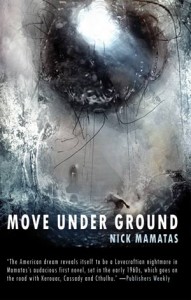
Before I became a writer, I was an electrician and camera operator for film and video, so I might still be doing that. Perhaps I would have been demoted to wedding videography by now.
Honestly, I’d probably just be busting hump somewhere: mate on a ferry, landscaping, doing A/V set-ups at a conference center or a university, real estate, bookselling. Writing is a lot like having a bunch of odd jobs anyway, so I’d just switch out to other odd jobs.
8. In your opinion, what are the five essential character traits any writer needs?
Needs to do what? I’ll just say “Get published well enough to have some non-incidental readers.” That, some audience of people would seek out the work. I’ll also leave out people who write purely instructional material, or compile basic information from the public domain. Plenty of people seek out that stuff, but not because of the writer or editor.
I’d say that writers need a certain kind of narcissism to walk through a major bookstore or library and say, “Yeah, what this place is missing is me.”
Patience is also a necessity—even the self-published who need not wait for a nod from an editor or publisher, need patience to find and cultivate an audience.
A masochistic sensibility is also required, given rejection, negative reviews, and generalized futility. I’m tempted to say humility, but that’s difficult given the narcissism is number one.
Of course, they need to live in an environment that tolerates economic spaces for writers. It’s not everywhere, didn’t always exist and we cannot assume that it will always exist.
And they need someone who cares.
9. What should always be edited out of a story? 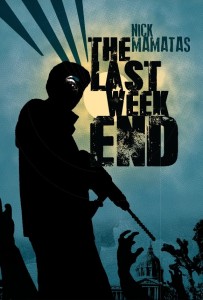
Pretty much anything that involves the appearance or activities of eyes. “Eye” sentences almost always sound ridiculous, and it’s amazing where these sentences turn up. I just read the wonderful memoir Nights at Rizzoli by author Felice Picano. And it’s great and a lot of fun and there is one howler when the author describes the face of one of his friends thusly: “she had big pools of brown eyes.” Yikes! If you weren’t imagining a pair of inflatable kiddie pools filled with slimy little brown eyes when you first read that sentence, you are now.
10. What’s next for Nick Mamatas?
I have a crime novel called I Am Providence that I have to finish. I’m pretty excited about my novelette “We Never Sleep” in The Mammoth Book of Dieselpunk. My 2007 novel Under My Roof is being made into a feature by director Jeffrey Lamont Brown, and I look forward to visiting the set in January and seeing where that goes. It should help bring the book, slightly revised, back into print as well.

